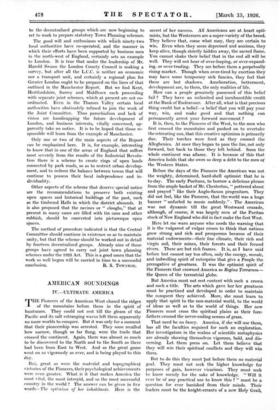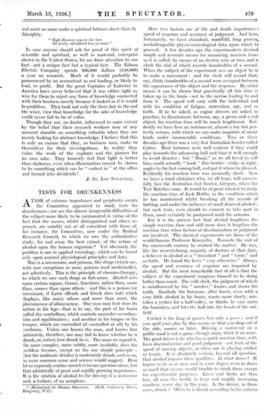AMERICAN SOUNDINGS
IV.—ULTIMATE AMERICA THE Pioneers of the American West chased the ridges of the mountains before them in the spirit of huntsmen. They could not rest till the gleam of the Pacific and its salt estranging waves left them apparently no more worlds to conquer. But it was only for a moment that their pioneership was arrested. They soon recalled how narrow, though so far flung, were the trails that crossed the continent. Again, there was almost as much to be discovered to the North and to the South as there had been from East to West. And so the great game went on as vigorously as ever, and is being played to this day.
But, great as were the material and topographical victories of the Pioneers, their psychological achievements were even greater. What is it that makes America the most vital, the most intrepid, and so the most successful country in the world ? The answer can be given in five words—The optimism of her inhabitants. Here is the secret of her success. All Americans are at heart opti- mists, but the Westerners are a super-variety of the breed.
They believe that, come what may, they are certain to win. Even when they seem depressed and anxious, they keep alive, though strictly hidden away, the sacred flame.
You cannot shake their belief that in the end all will be well. They will not hear of over-leaping, or over-expand- ing, or over-trading. They see before them a perpetually rising market. Though when over-tired by exertion they may have some temporary sick fancies, they feel that these are but shadows. Amelioration, betterment, development are, to them, the only realities of life.
How can a people genuinely possessed of this belief fail ? They have an unlimited and inexhaustible credit at the Bank of Endeavour. After all, what is that precious thing credit but a belief—a belief that you will pay your way, win, and make good and that nothing can permanently arrest your forward movement ?
It is, then, to the Pioneers of the West, to the men who first crossed the mountains and pushed on to overtake the retreating sun, that this creative optimism is primarily due. Their torches were fired as they crossed the Alleghenies. At once they began to pass the fire, not only forward, but back to those they left behind. Soon the whole continent was aflame. It is because of this that America holds that she owes so deep a debt to the men of the Western States.
Before the days of the Pioneers the American was not the weighty, determined, hard-shell optimist that he is to-day. The early Puritans, to borrow a delicious phrase from the ample basket of Mr. Chesterton, " pottered about and prayed " like their Anglo-Saxon progenitors. They did not feel, like the Pioneers, that the world was a huge banner " unfurled to music suddenly." . The American was not dynamic till the great Westward crusade, although, of course, it was largely men of -the Puritan stock of New England who did in fact make the first West.
Here let me warn anyone who needs the warning that it is the vulgarest of vulgar errors to think that nations grow strong and rich and prosperous because of their material endowments—their fine climate, their rich and virgin soil, their mines, their forests and their fecund rivers. These are but rich frames. It is, as I have said before but cannot say too often, only the energy, morale, and indwelling spirit of enterprise that give a People the prerogative of greatness. It was the optimist spirit of the Pioneers that crowned America as Regina Terrarum--:- the Queen of the terrestrial globe.
But America must not rest content with such a crown and such a title. The arts which gave her her greatness must be practised and developed in order to maintain the conquest they achieved. More, she must learn to apply that spirit to the non-material world, to the world of ideas as well as to the world of things. Her new Pioneers must cross the spiritual plains as their fore- fathers crossed the never-ending oceans of grass.
That need be no fancy. America, if she will use them, has all the faculties required for such an exploration. Her investigators in the realms of scientific metaphysics are already showing themselves vigorous, bold, and dis- cerning. Let them press on. Let them believe that they will win their spiritual conflicts and they will win them.
But to do this they must put before them no material goal. They must not seek the higher knowledge for purposes of gain, however vicarious. They must seek to know merely for the sake of knowledge. " Will it ever be of any practical use to know this ? " must be a question for ever banished from their minds. Their leaders must be the knight-errants of a new Holy Grail,. and must no more make a spiritual balance-sheet than th Almighty.
" High Heaven rejects the lore Of nicely calculated less or more."
In case anyone should ask for proof of this spirit of scientific and spiritual, as well as material, enterprise Shown in the United States, let me draw attention to one fact—not a unique fact but a typical fact. The Edison Electric Company spends 200,000 dollars (140,000) a year on research. Much of it would probably be pronounced by an accountant as not leading, or likely to lead, to profit. But the great Captains of Industry in America have never believed that it was either right or 'ise for them to reject any form of knowledge connected with their business merely because it looked as if it would be profitless. They took not only the finer, but in the end the wiser, view that knowledge for the sake of knowledge could never fail to be of value.
• - Though they are, no doubt, influenced to some extent by the belief that their research workers may at any moment stumble on something valuable when they are merely looking for abstract knowledge, I believe that this is only an excuse that they, as business men, make to themselves for their investigations. In reality they value the work of -the explorer and the pioneer for its own- sake. - They -honestly feel that light is better than darkness, even when illumination cannot be- shown to be something which can be "cashed in" at the office and turned into dividends J. ST. Lou STRACHEY.































































 Previous page
Previous page